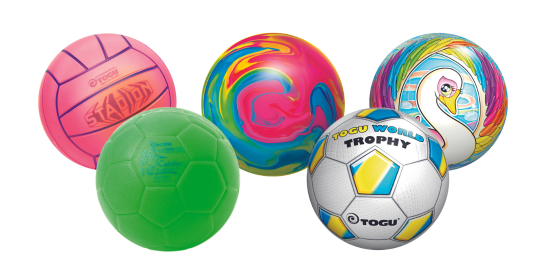Ball games are very important for the development of children. They promote motor skills, coordination and help strengthen social skills. There are different types of play balls. Each play ball has its advantages and disadvantages and is suitable for different age groups and areas of application. In this article you will learn more about them and which playballs are best for children.
What is the importance of ball games for children?
Ball games are very important for children’s development, as they can promote a variety of skills and competencies. There are many motor skills that can be improved: Agility, balance, coordination and dexterity. Social skills such as teamwork, cooperation and fairness can also be developed. Regular physical activity, such as that promoted by ball games, contributes to children’s health and well-being.
Ball games enhance children’s learning and cognitive development. They improve children’s ability to concentrate and think logically. Overall, ball games are a valuable activity for children because they can help promote their physical, social, and cognitive development.
Popular ball games for kids
Kids can enjoy a variety of activities and games with play balls. Here are some of the most popular and effective ways kids can use play balls:
- Ball throwing and catching: This activity is simple, but very effective in improving children’s motor skills and hand-eye coordination.
- Outdoor ball games: Games like soccer, basketball and volleyball are great ways for kids to improve their physical skills while also developing teamwork and social skills.
- Ball rolling and kicking: Children can also learn to roll or bump balls to improve their fine motor skills and hand-eye coordination.
- Juggling: Older children can learn to juggle balls to improve their dexterity and concentration.
Play balls provide children with pleasure and entertainment. They also allow to improve physical and cognitive skills.
What are the types of children’s playballs?
There is a wide range of balls for children. Some examples include inflatable balls, which are lightweight and easy to transport and are ideal for outdoor games like soccer and volleyball. Foam balls are soft and lightweight and especially suitable for young children, as they can be used indoors and outdoors and are safer than hard balls.
Plastic balls are durable and weather resistant and are great for games like basketball and handball. Softballs are also soft and lightweight, and are especially great for young children to improve their hitting and catching skills.
However, it is important to note that each game ball has its own advantages and disadvantages and is suitable for different age groups and applications. Therefore, you should always carefully consider which game ball is best for your child. Thus, there are children’s balls in small and children’s balls in large, according to the size of your child and the use of the children’s ball should be selected the ideal size.
Safety and care of children’s playballs
When choosing playballs for kids, it’s important to also pay attention to safety and care. Here are some things that should be considered:
- Safety: Make sure the ball is appropriate for the child’s age group and does not contain any small parts that can be swallowed or toxic materials. Check the ball and make sure it is sturdy and safe enough. It must withstand the demands of the game and not burst or tear.
- Storage: The ball should be stored in a dry and clean place when not in use. This will prevent damage or soiling. Balls should not be stored in the sun or near radiators, as this may cause deformation.
- Cleaning: Game balls should be cleaned regularly to remove dirt and bacteria. Cleaning depends on the type of ball – some can be cleaned simply with soap and water, while others require special cleaning agents. Make sure the ball is completely dry before using it again.
- Inspection: Check the ball regularly for damage or wear, especially if it is used often. If a ball is damaged or worn, it should be replaced to avoid injury.
By paying attention to the safety and care of playballs, you can ensure that children play safely and healthily and that the ball lasts longer.
Our TOGU experts advise:
Our tip for ball games is to always make sure you use the right ball for the game. Different ball games require different balls with specific characteristics, such as size, weight, material and bounce. If you use the wrong ball, the game can become uncomfortable or even dangerous.
It is also important to take proper care of the ball and clean it regularly to prolong its life and improve its play. You should also make sure that the ball is not over-inflated to avoid injury.

